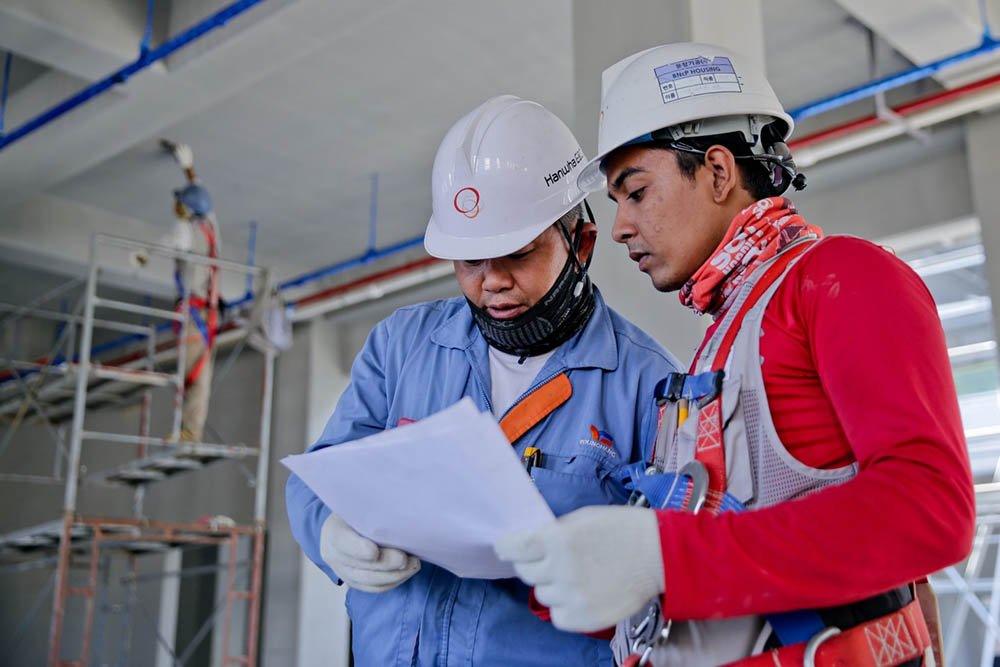The lack of workers in the US construction sector is becoming worse. Associated General Contractors stated in its 2022 Construction Outlook that 83% of contractors countrywide are experiencing difficulty filling some or all of their unfilled positions. Through a number of immigration procedures, American construction enterprises who find it difficult to staff their operations entirely with foreign nationals might recruit them. The possibilities available will vary based on the role, the amount of competence required, the credentials of the employee, and their nationality.
Program for H-2B Visas
Employers in the United States are able to recruit foreign citizens from around 80 countries that qualify for the H-2B visa program to work in seasonal and other temporary jobs that don’t need a lot of schooling.
Construction, along with food service, hospitality, entertainment, janitorial services, and landscaping, is one of the industries with the highest incidence of H-2B workers due to labor shortages that have plagued the sector for the past ten or more years.
Employers must be able to prove that the job is transitory in order to effectively hire foreign workers under this scheme. Additionally, companies have to prove that hiring foreign laborers won’t negatively impact similarly situated American workers and that they made an effort but were unable to find American workers to fill the post in order to obtain a temporary labor certificate.
Sadly, there is a lottery used to choose participants for the H-2B program since there is a greater demand than there are visas available each year. The total number of H-2B visas available in a given year is limited to 66,000, of which half are assigned to employees starting work between October 1 and March 31 and the other half to employees starting employment between April 1 and September 30.
An H-2B visa can be granted for a maximum of one year at a time, with extensions available for up to three years in total.

Program for H-1B Visas
Applications for the H-1B visa program for specialist professions may be made for jobs like project manager, architect, or engineer, which call for specific training and experience.
A bachelor’s degree in a relevant subject must be held by the foreign worker, and the post must typically demand at least a bachelor’s degree from the United States or its equivalent in another country in order to qualify as a specialized profession.
Like with H-2B visas, American firms must demonstrate that hiring a foreign worker won’t negatively impact similarly employed American workers or that they were unable to find workers locally.
One more resemblance is the cap on H-1B visas. Eighty thousand visas are granted annually, of which twenty thousand are set aside for advanced degree holders who have graduated from U.S. universities. Since there is a potential for over 200,000 applications for H-1B visas, the program is extremely competitive.
H-1B visas are good for three years at first, and they can be renewed for an additional three years.
TN Visa Initiative
If they obtain a work offer from a U.S. business, nationals of Canada and Mexico in specific professions may apply for TN nonimmigrant status under the unique economic ties established by the North American Free Trade Agreement. Some jobs that construction businesses may recruit for are on the list of jobs that qualify for tn visa, such as industrial designer, landscape architect, architect, and engineer.
There is no predetermined duration for TN nonimmigrant visas; they can be renewed for an additional three years after the original three-year period.
Unlike other employment-based visa schemes, there is no cap for TN visas, and the application procedure is less onerous.
Green Cards Based on Employment
Certain noncitizen employees may be sponsored by construction businesses for employment-based green cards. The categories of these immigrant visas are called “preferences,” and the third preference (EB-3) is the best option for the majority of construction jobs. Professionals, skilled laborers, and other employees who have a full-time, non-seasonal employment offer fall under the EB-3 category.
EB-3 visas are few each year, though, and the application procedure might take a long time. EB-3 visa applicants are issued a priority number if employers get permanent labor certification for the post from the Department of Labor and file a petition with U.S.
Citizenship and Immigration Services on behalf of the prospective employee. Their priority number must appear before their visa application may be completed. Each nation has a different priority number, and some countries have lengthy waiting periods for visa applicants—sometimes up to several years.
On-time Submission
The timing of your application submission is crucial. You have one year from the date of your arrival in the US to file an application for asylum. If you miss this deadline, your application may be rejected. Lawyers such as those at the Law Group of Iowa can guide you through the process and make sure your application is submitted on schedule and accurately.

Participate in every hearing
Following the submission of your asylum claim, a court hearing and/or an asylum interview will be arranged for you. It’s imperative that you show up for all of your appointments because failing to do so might seriously harm your case. You may receive advice on how to submit the required documentation and how to conduct yourself during interviews from an experienced attorney at a respectable legal company.
Final Thoughts
The shortage of workers in the construction industry in the United States has prompted employers to explore various visa programs to meet their staffing needs. The H-2B visa program caters to temporary and seasonal jobs, while the H-1B visa program targets specialized professions requiring specific training and experience.
However, each visa program has its limitations and requirements, and navigating the application process can be complex. Employers must demonstrate the unavailability of local workers and adhere to specific regulations to recruit foreign nationals successfully.
Timing and participation in the application process are crucial, underscoring the importance of seeking legal guidance to ensure compliance and maximize the chances of success.
As the construction industry grapples with ongoing labor shortages, understanding and leveraging available visa programs are essential for sustaining operations and meeting demand.











